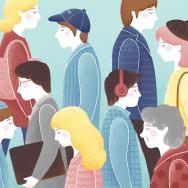As the novel coronavirus pandemic continues to spread, the advice from medical professionals is clear: Stay away from other people.
Given the current lack of COVID-19 testing in the United States, even those who are asymptomatic risk infecting others—endangering the lives of older adults or those who are immunocompromised.
But social distancing also could affect the health of the elderly, isolating them when they may be most in need of assistance. Now is the time to reach out to family, friends or neighbors who may be vulnerable, even if face-to-face contact isn’t advisable.
“Think about organizing something—even small changes, like leaving a note under the door or in the mailbox,” said University of Chicago sociologist Kathleen Cagney. “People should look for opportunities to do something that may make them slightly uncomfortable, but that could save someone’s life.”
An expert on social inequality and its relationship to health, Cagney is one of several UChicago scholars who have studied how isolation and loneliness can have more serious ramifications. Prof. Linda Waite—one of Cagney’s colleagues in UChicago’s Department of Sociology—argues that the medical system should more closely examine social well-being. Research from the late neuroscientist John Cacioppo found that loneliness can trigger adverse physiological reactions.
In addition to exacerbating chronic health conditions, Cagney said that isolation can prompt unhealthy changes in behavior. Those who feel lonely may smoke or drink more often. They may feel disengaged from their daily routine and forget to turn off the stove.
As director of the Population Research Center at NORC and the University of Chicago, Cagney also emphasized how strong social networks can support vulnerable people during other crises, such as heat waves.
“In places that are socially cohesive, people notice,” she said. “They feel comfortable going and knocking on the door to make sure older adults are OK—that they have a fan, or other supplies they might need.”
Many of those same principles still apply in the midst of the novel coronavirus. Those who care for elderly family and friends could leave care packages. Physical check-ins could be replaced by phone or text chains, which may work better for older adults unfamiliar with video chatting apps like Skype or FaceTime.
Cagney also advised reaching out to a handful of neighbors and keeping track of what they might need.
“Think about the people in your building,” Cagney said. “Do you know all their general age ranges? If not, who might know? And not just age, but other factors that might make them vulnerable. Are there ways to develop mechanisms to stay connected?
“If people take responsibility for knowing what’s going on in, say, three adjacent units, that’s not a significant burden. This is an opportunity to come together for the common good.”

